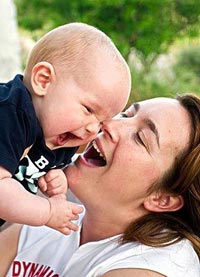|
|

|
|
Babies who use many gestures to communicate when they are 14 months-old have much larger vocabularies when they start school than those who don't, US researchers said on Thursday.
|
Babies who use many gestures to communicate when they are 14 months-old have much larger vocabularies when they start school than those who don't, US researchers said on Thursday.
They said babies with wealthier, better-educated parents tend to gesture more and this may help explain why some children from low-income families fare less well in school.
"When children enter school, there is a large socioeconomic gap in their vocabularies," said the University of Chicago's Meredith Rowe, whose study appears in the journal Science.
Gestures could help explain the difference, Rowe told the American Association for the Advancement of Science annual meeting in Chicago.
Vocabulary is a key predictor of school success. Earlier research showed that well-off, educated parents tend to talk to their children more than their poorer, less-educated peers.
"What we are doing here is going one step earlier and asking, does this socioeconomic status relate to gesture, and can that explain some of the gap we see at school entry," Rowe said.
The researchers filmed 50 Chicago-area children and parents from diverse economic backgrounds and counted the number of gestures, such as pointing at a picture.
The team found that 14-month-olds from high-income, well-educated families used gesture to convey an average of 24 different meanings during each 90-minute session, compared with 13 meanings conveyed by children from lower-income families.
When the same children entered school at age four and a half, those from higher-income families had better vocabulary scores on standardized tests.
"At 14 months, an age when there aren't even socioeconomic differences in their talk yet, we see there are differences in their gestures," Rowe said.
The videos revealed that parents from wealthier families gestured more with their children than the other parents.
Rowe said the findings suggest that gestures can at least partly explain vocabulary differences between the groups, and may prove useful as the basis for interventions.
"Can we manipulate how much parents and children gesture, and if so, will it increase their vocabulary?" Rowe said.
点击查看更多双语新闻
(Agencies)
|
美国研究人员于上周四称,如果宝宝在14个月大时会用很多动作进行交流,那么到了上学的时候他们掌握的词汇会比不喜欢用动作交流的宝宝多。
研究人员说,家庭较富裕、父母受教育水平较高的宝宝更爱用动作进行交流,这或许可以解释为什么有些低收入家庭的孩子学习成绩不太理想。
芝加哥大学的梅里蒂斯•罗伊说:“孩子在刚上学时,他们在词汇方面存在一个很大的社会经济差距。”该研究结果在《科学》期刊上发表。
罗伊在芝加哥召开的“美国科学进步协会”的年会上说,动作可以解释这一差别。
词汇是决定孩子学习成绩好坏的一个关键因素。此前的研究发现,家庭收入和受教育水平较高的家长比收入和受教育水平较低的家长更经常与孩子说话。
罗伊说:“我们需要解决的问题就是,再往前追问一下:这种社会经济地位与孩子在日常交流中所做动作的多少是否有关,是否能解释孩子在刚上学时存在的一些差距?”
研究人员对芝加哥地区50对经济背景各不相同的父母和孩子进行了拍摄,并统计了他们所做动作的数量,比如指着一张画。
研究小组发现,在每个90分钟的时间段内,来自高收入和高文化水平家庭的14个月大的孩子用动作表达了24种不同的意思,而低收入家庭的孩子只用动作表达了13种意思。
当这些孩子到了四岁半开始上学时,高收入家庭的孩子在标准化考试中的词汇得分较高。
罗伊说:“在14个月大时,孩子在语言上还不存在社会经济的差别,但我们看到他们在动作上已经有了差别。”
从所拍摄的视频可以看出,高收入家庭的家长比其他家长更倾向于用动作与孩子交流。
罗伊说,研究结果表明,动作至少可以解释为什么不同家庭背景的孩子在词汇掌握上存在差别,而且或许能为社会干预提供基础。
罗伊说:“我们能控制父母和孩子在日常交流中使用多少动作吗?如果可以,那么这能增加孩子的词汇量吗?”
(英语点津姗姗编辑)
|